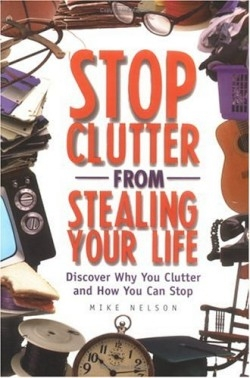Stop Clutter from Stealing Your Life
Discover Why You Clutter and How You Can Stop
“How useful is that two-legged stool in the corner of the living room? Do we really need those prescriptions that expired when Reagan was president?” Nelson is a harsh taskmaster. An acknowledged clutterer, this author of several books about traveling south of the border wrote his latest because he realized his “habit” was out of control and detrimentally affecting his life.
In this first-person account, Nelson describes what life has been like for him over the years, and his recent attempts to become an organized and normal individual. “Normal people didn’t have to dodge Big Mac boxes, unfolded maps, overcoats, old clothes, magazines, and newspapers in order to get into their cars.”
He admits each reader may take something different away after reading his book—it depends, he says, upon the severity of the condition. He offers twelve common clutterer traits. Number one is insecurity, probably, he believes, the root cause of the whole problem. Number ten is “feeling there is not enough time.” One solution here is the to-do list, but he recognizes “a common problem with to-do lists is that we lose them and then start new ones.” Keeping it on his computer helps him.
Midway through the book, Nelson walks the reader through the experience of de-cluttering. It’s more than cleaning, he warns. “It is an emotional roller coaster.”
He examines the pros and cons of doing it yourself, asking another clutterer or friend to help, or going the route of a professional organizer. He advises beginning with something that will give immediate gratification—forget that hidden drawer; how about the bed instead? “Wouldn’t it be nice to actually be able to slide into bed without having to wedge yourself in between the debris? Many have a tendency to surround ourselves with possessions so that we will feel secure in our rest.”
In further chapters, Nelson deals with the psychological view of cluttering (obsessive-compulsive behavior is examined), the spiritual view, and dealing with the repercussions of financial clutter.
Two short, but very interesting chapters cover public clutter and notable hoarders, such as the young millionaire whose death led to the discovery of his condo “knee deep in garbage and decaying food.”
There’s bound to be some nugget here any person can use to make their own life less cluttered.
Reviewed by
Robin Farrell Edmunds
Disclosure: This article is not an endorsement, but a review. The publisher of this book provided free copies of the book to have their book reviewed by a professional reviewer. No fee was paid by the publisher for this review. Foreword Reviews only recommends books that we love. Foreword Magazine, Inc. is disclosing this in accordance with the Federal Trade Commission’s 16 CFR, Part 255.

